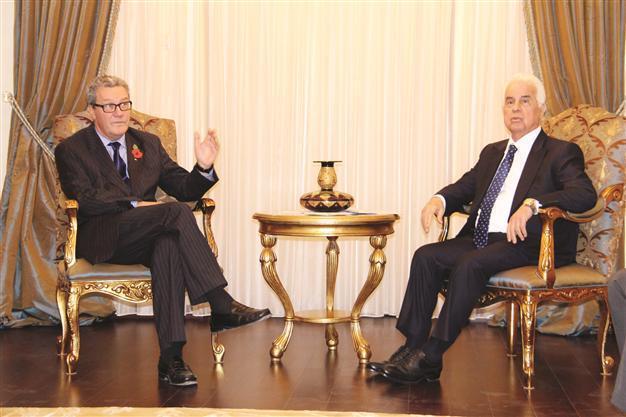Let’s just stay as friends, Turkish Cypriots to Greeks
NICOSIA - Hürriyet Daily News

UN envoy Alexander Downer’s (L) consecutive visits to the island have not yielded a result yet. President Derviş
Eroğlu (R) said creating a single Cypriot nation composed of Turks and Greeks is impossible. AA photo
Creating a single Cypriot nation composed of Turks and Greeks is impossible, and if the two sides cannot agree on a peaceful solution, it would be better for them to remain “friends” while enjoying sovereignty in their respective territories, the president of Turkish Cypriots has suggested.
“It’s true that the Greek Cypriots do not want to marry us or get a divorce. Then what can happen is that the Greek Cypriots will live in the south and we’ll live in the north. We can’t create a nation from these two communities in Cyprus,” Derviş Eroğlu, president of Turkish Cyprus, told a group visiting journalists on the occasion of the 30th anniversary of the foundation of the independent Turkish Cypriot state.
Eroğlu said Turkish and Greek Cypriots had been engaged in peace talks since the late 1970s, producing two important documents, one in 1988 during Perez de Cuellar’s term as U.N. secretary-general and the other in 2004 during Kofi Annan’s term. “Both of them were rejected by the Greek Cypriots,” Eroğlu said.
On the eve of the 30th anniversary of the foundation of the Turkish Republic of Northern Cyprus, Eroğlu was both working to convince his Greek Cypriot counterparts to launch negotiation talks and coordinating preparations for the 30th anniversary of his republic.
The TRNC was announced as an independent state on Nov. 15, 1983, by late President Rauf Denktaş, only nine years after Turkey’s intervention on the island. It has been recognized only by Turkey since then.
U.N. Secretary-General Ban Ki-moon called on the two parties to start a new round for resolving the decades-old problem in September, but although both parties have responded positively, it has not been possible to launch negotiations due to Greek Cyprus’ impositions of pre-conditions.
“This is the first time that we have faced pre-conditions to begin talks. First, they have asked for the return of Varosha [in Famagusta] from us. What we told them is that Varosha was part of the comprehensive settlement and it will be discussed under the territory chapter,” said Eroğlu.
‘Greek Cypriots want evolution of the current state’The second Greek Cypriot pre-condition was the issuance of a joint statement underlining the fundamentals of upcoming talks, he said.
“We told them it was not necessary. But we accepted the proposal. And we also accepted a draft written by Alexander Downer [Ban’s special envoy], but it was rejected by Greek Cypriots. And unfortunately we could not start talks,” Eroğlu said. “We’re stuck at the point of preparing the joint statement. I think it’s another trick of the Greek Cypriots to gain time.”
For the president, it is not only about gaining time but also about avoiding the creation of a new partnership state.
“What he [Greek Cypriot President Nicos Anastasiades] wants is to transform the existing Republic of Cyprus into a federal state. Therefore, they do not want a solution on the basis on two equal constituent states but an evolution of the current state,” Eroğlu said. “This cannot be done because there are currently two sovereign states on the island.”
In a meeting with the same visiting group of journalists, Foreign Minister Nami Özdil said the Greek Cypriots were attempting to broaden the scope of the joint statement by inserting sensitive chapters of upcoming negotiations.
Underlining that the south was pressing to include the concepts of single sovereignty, single citizenship and single international identity, Özdil said: “If priorities are to be mentioned, then the joint statement should address both sides’ priorities. In very recent talks, the gap between two sides has been narrowed. The Greek Cypriot side took some steps to accommodate our sensitivities. We hope the meetings of the representatives will yield a result and leaders will be able to meet soon to start talks.”
“Greek Cypriot leader Anastasiades wants to engage in a give-and-take process but he only wants to take without giving anything,” Eroğlu said.
Samaras against the cross talksIn addition to Greek Cypriots’ unwillingness, Athens has also been accused of erecting fresh barriers to talks by not permitting cross visits of Turkish and Greek Cypriot representatives to Athens and Ankara simultaneously and at the same level.
“The cross talks cannot be held because as far as we have heard, Greek Prime Minister Samaras is against it. As we know, [Turkish Foreign Minister] Ahmet Davutoğlu called his Greek counterpart a few days ago to set a date to realize this meeting. But he was told that Athens was not ready for this,” Eroğlu said.
According to Eroğlu, Davutoğlu told his Greek counterpart that Turkey would be ready on the date Greece will feel ready for such a visit.
Samaras barely survived a vote of confidence last week and a controversial visit from a Turkish Cypriot representative would put him in a more problematic situation politically, Özdil said.
Not another 50 years of talksWhen asked about Turkish Cypriots’ possible reaction if the talks fail to settle the decades-old issue, Eroğlu said the north was engaging in negotiations in the understanding that it would produce a result.
“The Cypriot negotiations are 50 years old. The whole world and the Greek Cypriots should be aware that no one can keep the Turkish Cypriots at the table for another 50 years,” he said.
Özdil, for his part, said the Cyprus question had exhausted the international community and the United Nations. “The first U.N. resolution on Cyprus was taken in March 1964. That makes a half century. A lot of time, a lot of money has been wasted. The U.N. also says ‘enough is enough.’”
